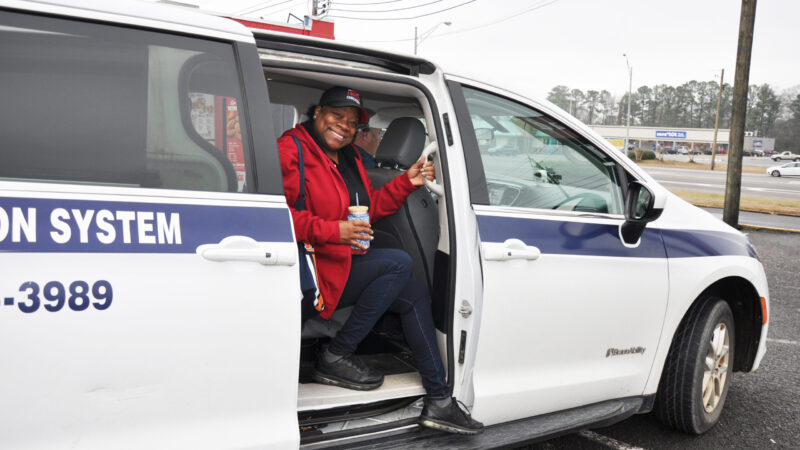2nd Homes
John Hughes love affair with Smith Lake started pretty innocently. He and his wife Margo were living near the beach in South Florida, but they wanted a place on a mountain lake. They bought some land in the Alabama foothills.
“We bought us a trailer to start with. And I made her keep coming back. Every four or five days we’d get back home and I’d say let’s go back and she said ‘you gonna do that to me, I’m gonna buy a house.’ And that’s how it’s started!”
“Every time I went around this lake I kept finding something I liked better. So I just kept moving him. As long as he had his fish and a dock, he was happy!”
The house they’re in now sits high on a rock ledge, overlooking a boat house filled with John’s toys.
“This to me is getting away from the H.B. What I call the hustle and bustle! We have a two slip boat dock, with a 24 foot voyager and a jet ski and just the toys.”
This is the Hughes’s seventh house on Smith Lake in just three years. They have the “2nd home fever” and bad! Partly because of the profits they’re making. They bought their last home for just over $300,000. They painted it and added garage doors. They weren’t planning on selling it, but a realtor called saying someone was interested. They showed the house and one hour later had a contract for $379,000.
“We were in the last house probably four months and the house before that three months, so it flips pretty fast,” Margo says with a laugh.
It’s that promise of profit that’s laid the foundation for a boom in second home sales, says University of Alabama real estate expert Leonard Zumpano.
“After the bubble burst in the stock market several years ago, investors who got burned decided they were looking for safer alternatives and maybe higher yields than they could get on standard CDs and other types of fixed interest accounts and real estate looked to be a market that offered maybe better returns and less risk.”
There were 2.82 million second home sales in 2004, up 16 percent from 2.42 million the previous year. And Zumpano expects that number to continue climbing, thanks to historically low interest rates and a shift in demographics.
“There is a huge blip in the population and that?s the baby boom generation and each year more of them become empty nesters. These folks, their kids are getting out of college, they’ve been spending $30k, $40k, $50k a year in tuition and related expenses. They’re probably at or very close to their peak earning years and they’re looking for a place top put that money.”
What they’re finding is real estate. But there are several things a would-be 2nd home buyer must consider, starting with lifestyle. If you’ve got a small kids, a weekend home at the lake may sound like heaven. But once the kids are older, let’s face it, they’ll probably want to spend more time with friends than family. If you’re buying a second home that will eventually become your retirement place consider whether you’ll really want to be out in the boondocks in your golden years.
Money is another major issue. Financing a second-home is often tougher than buying the first because lenders consider it a bigger risk. They may charge as much as two points more in interest than for a primary home. And, they may require a larger down payment, says Alabama realtor Phyllis Holcombe.
“If this is a second home you’re buying and you can’t afford to put 20 percent down, then I would say not to do it! I would not recommend you do it!”
But for many people, especially boomers with homes that have seen marked appreciation, real estate begets real estate. It’s possible to take out a home equity loan on house number one to help finance house number two. Home equity loans usually boast a lower interest rate and some lenders will loan you up to 125% of the appraised value.
There are other costs that vary with how the second home is used. Homeowner’s insurance premiums are often higher on second homes because the chance of break-in is greater. If the second home is used as a rental, insurance can jump as much as 20%. And you might have to hire a management company to handle day-to-day issues.
There are also tax implications. It’s possible to claim a mortgage-interest deduction for a vacation home, but if it’s rented out more than two weeks a year that deduction will likely be lost. And, taxes must be paid on the rental income.
None of this dissuades Luke and Jean Story. They’ve been up to Alabama’s Smith Lake on several weekends, looking for properties.
“The lake is absolutely beautiful,” observes Luke. “The water is clear and the views are just unmatched. We love every bit of it and some of the things we looked at two weeks ago are already sold so it’s sort of putting the pressure on us to take some action real quick!”
His wife agrees. “I’m just anxious to get up here. That’s all I can say!”
Surgeon general nominee Means questioned about vaccines, birth control and financial conflicts
During a confirmation hearing, senators asked Dr. Casey Means about her current positions and her past statements on a range of public health issues.
Kalshi reveals insider trading case against editor for MrBeast
With prediction markets booming, so have concerns about insider trading. Now, Kalshi has disclosed its first public actions against accounts suspected of trading on confidential information.
Greetings from Jordan’s Wadi Rum desert, where patches of green emerge after winter rains
Wadi Rum's otherworldly landscape is where Star Wars movies and The Martian were filmed. In late winter, plants emerge in this desert — but some are toxic to camels, so their herders must protect them.
Lack of transportation keeps many Alabamians from working. Rural public transit programs are trying to help
While lack of transportation is a major employment barrier in Alabama, few people take public transit to work. That dynamic is even more pronounced in rural areas.
When a horse whinnies, there’s more than meets the ear
A new study finds that horse whinnies are made of both a high and a low frequency, generated by different parts of the vocal tract. The two-tone sound may help horses convey more complex information.
Hundreds of American nurses choose Canada over the U.S. under Trump
More than 1,000 American nurses have successfully applied for licensure in British Columbia since April, a massive increase over prior years.






